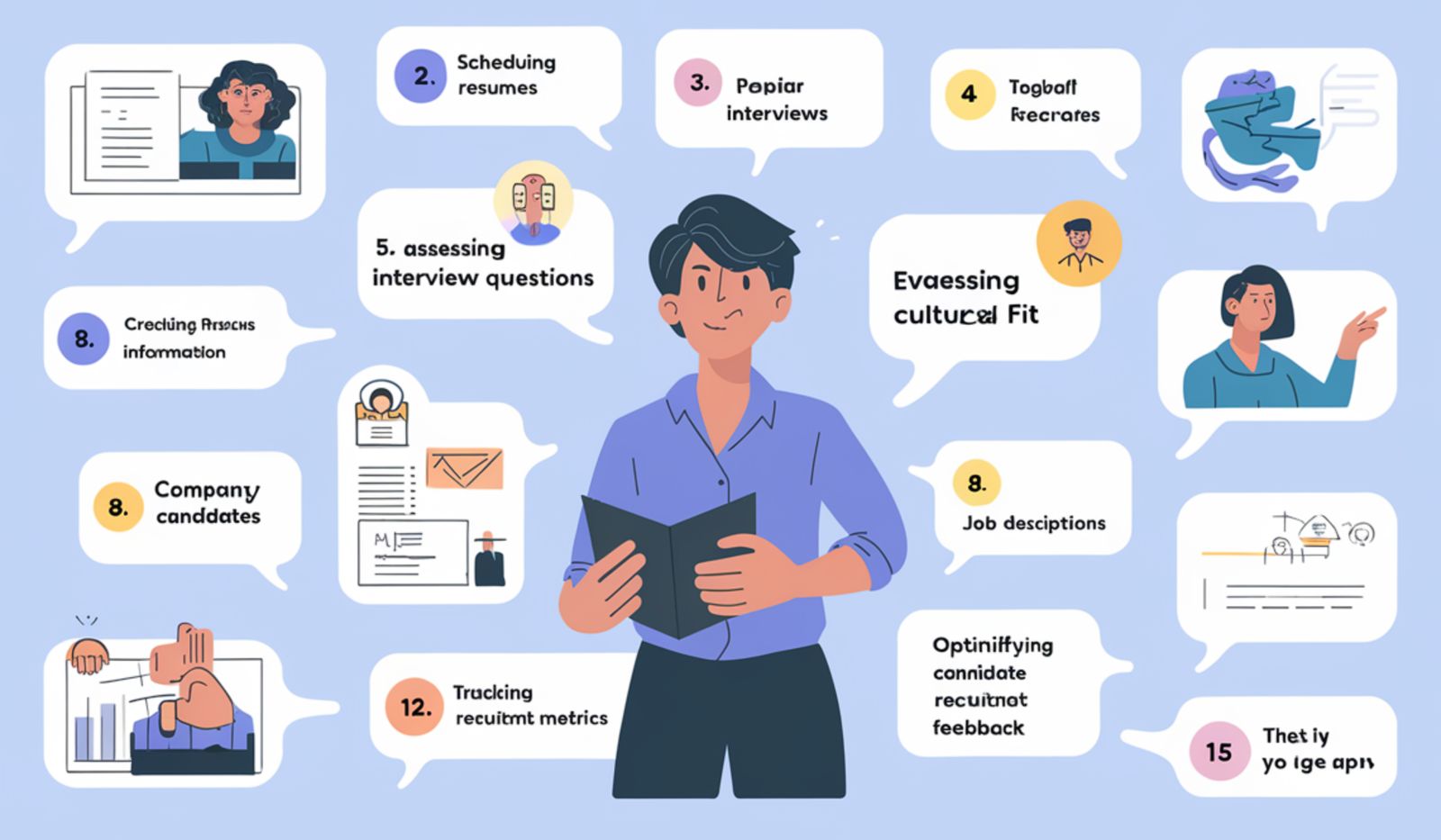15 Use Cases of ChatGPT for Recruiters

[ad_1]
Recruitment is a dynamic process that has undergone tremendous transformation in recent years, with the adoption of new technologies playing a crucial role. One of the latest tools revolutionizing the recruitment landscape is OpenAI’s ChatGPT. With its advanced natural language processing capabilities, ChatGPT offers recruiters numerous opportunities to streamline their processes, improve candidate experiences, and make better-informed decisions. Below, we explore 15 practical use cases of ChatGPT for recruiters that demonstrate its transformative potential.
1. Crafting Engaging Job Descriptions
Writing job descriptions can be time-consuming and requires a good understanding of the role. ChatGPT can help recruiters create detailed and engaging job descriptions based on minimal input. By specifying job titles, core responsibilities, and key qualifications, recruiters can receive comprehensive job descriptions that are ready to be posted, saving significant time and effort.
2. Personalized Candidate Outreach
In today’s competitive job market, personalization is key to attracting top talent. ChatGPT can generate personalized messages for reaching out to candidates, whether for initial contact or follow-ups. It can take into account details such as the candidate’s background, experience, and interests to craft messages that are more likely to grab their attention and lead to positive responses.
3. Screening Candidate Resumes
Initial resume screening can be labor-intensive, especially for roles that attract hundreds of applicants. ChatGPT can be used to automate the screening process by extracting key information from resumes and summarizing it. This helps recruiters quickly identify candidates who meet the basic requirements for a position, making the screening process more efficient.
4. Preparing Interview Questions
ChatGPT can help recruiters generate tailored interview questions based on job descriptions and candidate resumes. By analyzing the skills and experience required for the role, ChatGPT can suggest relevant technical, behavioral, and situational questions, ensuring that interviews are structured and thorough.
5. Enhancing Employer Branding
Maintaining a positive employer brand is crucial for attracting top talent. ChatGPT can assist in crafting content for social media posts, career pages, and email campaigns that highlight the company’s culture, values, and benefits. This content helps to showcase the organization as an attractive employer, contributing to better candidate engagement.
6. Responding to Candidate Queries
Recruiters often face a barrage of repetitive questions from candidates, ranging from application status to company policies. ChatGPT can be integrated into chatbots or used directly by recruiters to provide instant, consistent responses to candidate inquiries. This not only saves time but also ensures candidates receive accurate information promptly.
7. Automating Follow-Up Emails
Staying in touch with candidates throughout the recruitment process is important, but manually crafting follow-up emails can be tedious. ChatGPT can automate follow-up communications, generating polite reminders, thank-you notes, or updates to keep candidates informed and engaged.
8. Providing Interview Feedback
Providing candidates with personalized feedback after interviews is a great way to maintain a positive impression, even for those who are not selected. ChatGPT can help recruiters draft constructive and empathetic feedback, emphasizing areas where the candidate excelled and suggesting opportunities for improvement.
9. Conducting Market Research
ChatGPT can assist recruiters in conducting market research to understand salary trends, skills in demand, and other industry-specific insights. By analyzing data, ChatGPT can generate summaries that help recruiters stay informed, make better decisions, and create more competitive offers.
10. Supporting Diversity Hiring Initiatives
Diversity hiring is a priority for many organizations, but creating inclusive job descriptions and interview processes can be challenging. ChatGPT can help ensure that job descriptions are free from bias and suggest inclusive language. It can also generate structured interview questions that reduce the impact of unconscious biases, supporting fairer recruitment practices.
11. Creating Pre-Screening Assessments
Pre-screening assessments are an effective way to filter candidates before they reach the interview stage. ChatGPT can help recruiters create assessments that evaluate specific skills relevant to the role. Whether it is creating technical quizzes or situational judgment tests, ChatGPT can help ensure that assessments are well-designed and focused.
12. Keeping Candidates Engaged
Candidate engagement is crucial in keeping potential hires interested throughout the recruitment process. ChatGPT can generate personalized messages to engage candidates at various stages of the hiring process, such as updates about their application status or upcoming interview tips, which helps create a positive candidate experience.
13. Drafting Job Offers
Writing job offer letters can be time-consuming, especially when there is a need for customization based on different roles or seniority levels. ChatGPT can generate professional and personalized offer letters, ensuring that key terms are clearly outlined and the tone is welcoming. This helps recruiters speed up the hiring process while ensuring accuracy.
14. Talent Pool Management
Recruiters often maintain a database of potential candidates who may be suitable for future openings. ChatGPT can assist in managing these talent pools by crafting personalized check-in emails and suggesting strategies for keeping candidates engaged until suitable roles become available. This ensures a continuous flow of talent, reducing time-to-hire for future positions.
15. Providing Training and Onboarding Content
After hiring, the onboarding process is crucial for setting new employees up for success. ChatGPT can help recruiters create onboarding documents, training content, and FAQs for new hires. This ensures that new employees receive all the information they need in an engaging and easy-to-understand manner, facilitating a smoother transition into their roles.
Conclusion
The versatility of ChatGPT makes it an invaluable tool for recruiters looking to optimize their processes, improve candidate experience, and make data-driven decisions. By incorporating ChatGPT into their workflows, recruiters can focus more on strategic tasks and building relationships, while automating many time-consuming aspects of recruitment.
Shobha is a data analyst with a proven track record of developing innovative machine-learning solutions that drive business value.
[ad_2]
Source link



